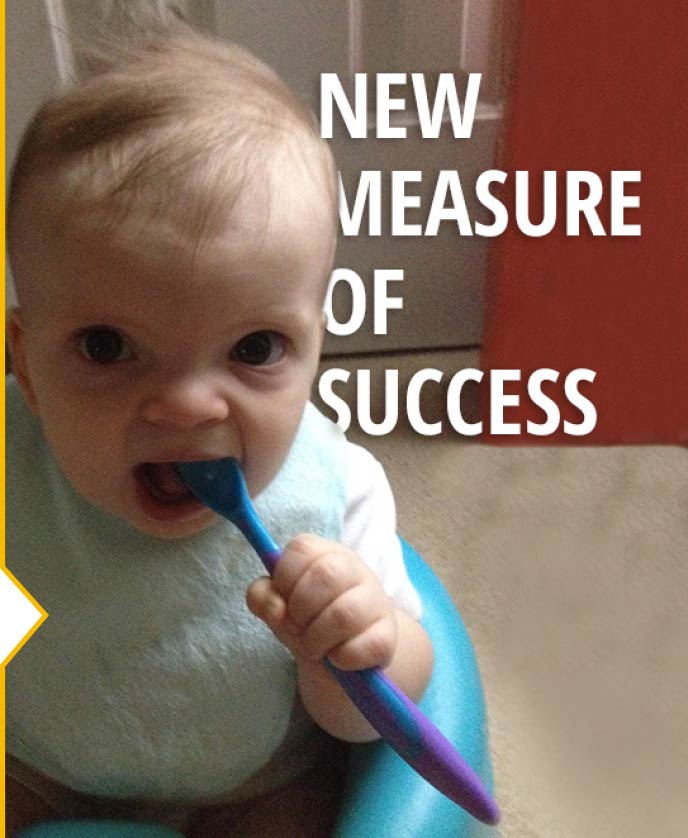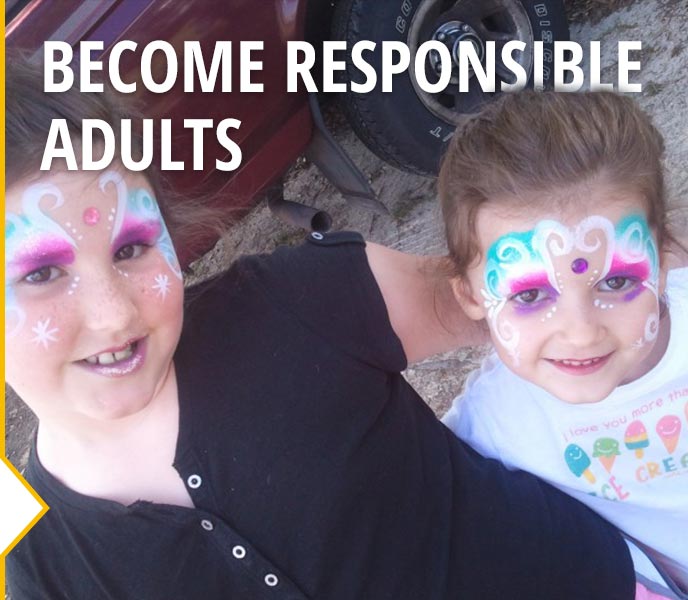They’re in the stage of life that has been called the prime earning years, but the prime may feel a bit sub-prime to them given the economy. Among older Gen Xers, 62% say their income is the same or lower than it was five years ago. Many are struggling to keep up—31% of younger Gen Xers say they’re “barely keeping up” or “slowly falling behind” on their debt payments.[3] Given their life stage, financial pressures are demanding. They are the group most likely to have children at home (68%), a mortgage (44%) and a child leaving for college in the next 12 months (13%).[2]

68%
children at home

44%
a mortgage

13%
a child leaving for college in the next 12 months
a child leaving for college in the next 12 months
a mortgage
children at home
“Money is always a worry. I worry about retirement—will we ever have enough to do that. I worry about putting my kids through college or as they grow up and need things like braces and playing sports, all those things that cost money. Also now being a home owner I worry about needing to replace the roof, new carpeting, water heaters, all those household repair jobs.”
(Mindy, Gen X)
“My daughter... She is the light of my life and the center of my universe. I get to see her change every day as a result of our interactions and the life we have surrounded her with.”
(Michael R., Gen X)
 “My daughter... She is the light of my life and the center of my universe. I get to see her change every day as a result of our interactions and the life we have surrounded her with.”
“My daughter... She is the light of my life and the center of my universe. I get to see her change every day as a result of our interactions and the life we have surrounded her with.”
(Michael R., Gen X)
Like the other generations, Gen X’s personal definition of success is tightly linked to their children’s success. Being a connected parent is important, but they’re also looking for specific traits to define their success—children who become happy, well-adjusted adults and are on a positive path in life, able to build their own successful life relationships.
Gen X Middle-Income America[1]

69%
agreed “Raising my child/children to be good/happy/capable adults” defines success

41%
said it is one of the top 3 ways they define success
agreed “Raising my child/children to be good/happy/capable adults” defines success
said it is one of the top 3 ways they define success
“I have two children that love and respect their parents immensely. It feels like I have done something right so far this whole parenting thing. It makes me feel good to see my kids growing up the way I would hope and with the values I would hope out of them.”
(Mark D., Gen X)
“I want to look back on life and see I raised 3 great kids that are happy, caring, smart and well-mannered.”
(Jenny, Gen X)
 “I want to look back on life and see I raised 3 great kids that are happy, caring, smart and well-mannered.”
“I want to look back on life and see I raised 3 great kids that are happy, caring, smart and well-mannered.”
(Jenny, Gen X)
Gen X expressed some of the strongest emotions about money. And it’s warranted: In 2014, Gen X averaged nearly 60% higher debt levels than people their same age carried in 2000.[4] That’s despite having the sharpest drop in homeownership since the recession struck.[5]
They’re acutely aware that financial setbacks today impact their lives now and in the future. Some feel overwhelmed to the point of resignation, while others are finding new ways to stay afloat.
Gen X Middle-Income America[1]

85%
agreed “Having enough money to be financially stable” defines success

34%
said it is one of the top 3 ways they define success
agreed “Having enough money to be financially stable” defines success
said it is one of the top 3 ways they define success
“I always wonder if we will have enough to live off of in our later years. I can’t even think about sending my daughter to college or anything bigger like that. I used to make a monthly budget but stopped as it just seemed to promote fighting between my wife and me.”
(Jim, Gen X)
 “I always wonder if we will have enough to live off of in our later years. I can’t even think about sending my daughter to college or anything bigger like that. I used to make a monthly budget but stopped as it just seemed to promote fighting between my wife and me.”
“I always wonder if we will have enough to live off of in our later years. I can’t even think about sending my daughter to college or anything bigger like that. I used to make a monthly budget but stopped as it just seemed to promote fighting between my wife and me.”
(Jim, Gen X)
“With a baby on the way and my wife needing to quit her job, now more than ever increasing my income has become important to me. [In addition to my full-time job] I have a part-time position through a small IT consultant and many small side jobs repairing computers.”
(David, Gen X)
Financial stability seems to feel more out of reach for Gen Xers than other generations. Debt bogs them down and gets to be exhausting, forcing them to make compromises between what could be and what reality allows. Overall, Gen X realizes they can’t have it all and instead tries to be realistic about the money they will need in the future. A focus on paying off debt was often the first step in their plan to “finally start saving money.”
“Financial gain used to be how I would measure success. As I have gotten older, though, reality has continued to sink in and my definition has changed. Now that I have a family, financial stability is my new measure of success. I want to be able to provide a safe home for my family.”
(Mark R., Gen X)
 “Financial gain used to be how I would measure success. As I have gotten older, though, reality has continued to sink in and my definition has changed. Now that I have a family, financial stability is my new measure of success. I want to be able to provide a safe home for my family.”
“Financial gain used to be how I would measure success. As I have gotten older, though, reality has continued to sink in and my definition has changed. Now that I have a family, financial stability is my new measure of success. I want to be able to provide a safe home for my family.”
(Mark R., Gen X)
“If I were out of debt (credit cards, loans, etc.) that would affirm my life was a success because I would be able to afford better things and not need to take on added debt to do so.”
(Mark D., Gen X)
Although middle-income Gen X is well entrenched in the working world, they do not strongly link their personal success to career success. From our qualitative feedback, many Gen Xers look at work primarily as a way to provide for their family. Compared with the other segments, they spoke less about work being a place where they found strong personal fulfillment.
Gen X Middle-Income America[1]

47%
agreed “Advancing to the top of my profession” defines success

4%
said it is one of the top 3 ways they define success
agreed “Advancing to the top of my profession” defines success
said it is one of the top 3 ways they define success
“That I have enough money (not a lot) but enough for our family to live comfortably... Also that I was not so involved in work that I could be a part of my family’s life. Sometimes these two seem to be in direct conflict with each other... real success is having both of these at the same time.”
(Jim, Gen X)
 “That I have enough money (not a lot) but enough for our family to live comfortably... Also that I was not so involved in work that I could be a part of my family’s life. Sometimes these two seem to be in direct conflict with each other... real success is having both of these at the same time.”
“That I have enough money (not a lot) but enough for our family to live comfortably... Also that I was not so involved in work that I could be a part of my family’s life. Sometimes these two seem to be in direct conflict with each other... real success is having both of these at the same time.”
(Jim, Gen X)
“I have always believed that my family was my career and my job was just a way to provide for what really matters in life.”
(Amanda, Gen X)
* Percentage who selected this definition as one of their top-3 definitions of success
** Percentage who agree this statement is a definition of success for them
CITATIONS
1 What Matters NowTM ORC Data, 3 waves, total N=3,054.
2 GfK Mediamark Research & Intelligence, LLC, 2013 MRI Doublebase, as provided by Hiebing.
3 LIMRA, “U.S. Consumers Today – The Generations,” 2014.
4 William R. Emmons, “Generations X and Y: Facing Economic and Financial Challenges in the Shadow of the Baby Boom,” Federal Reserve Bank of St. Louis, March 6, 2014.
5 Derek Thompson, “Home Ownership in America Has Collapsed—Don’t Blame Millennials,” The Atlantic, Oct. 28, 2014.
6 Bruce Drake, “6 New Findings about Millennials,” Pew Research Center, March 7, 2014.
7 Harvard University Institute of Politics, “Survey of Young Americans’ Attitude Toward Politics and Public Service: 24th Edition.”
8 Jeanine Skowronski, “More Millennials Say ‘No’ to Credit Cards,” Bankrate.com.
* Percentage who selected this definition as one of their top-3 definitions of success
** Percentage who agree this statement is a definition of success for them




























































